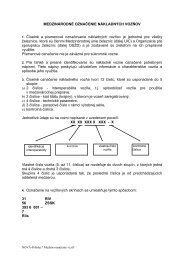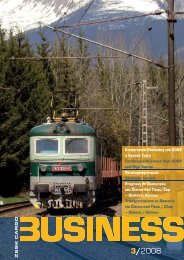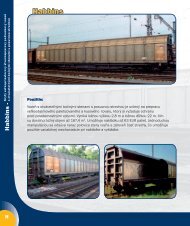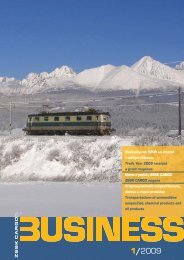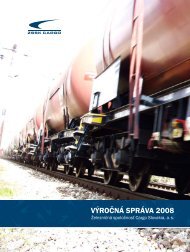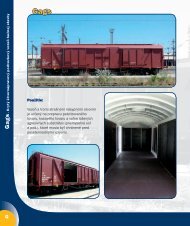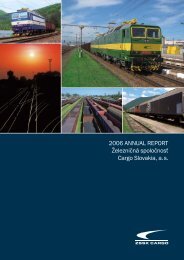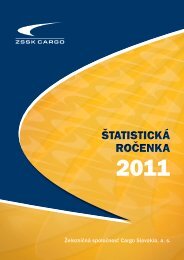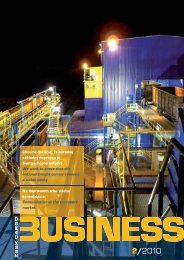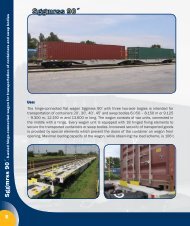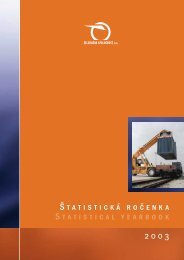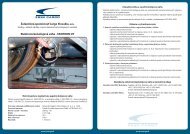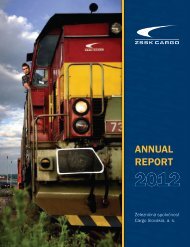CARGO BUSINESS 1-10.indd - ZSSK Cargo
CARGO BUSINESS 1-10.indd - ZSSK Cargo
CARGO BUSINESS 1-10.indd - ZSSK Cargo
- No tags were found...
You also want an ePaper? Increase the reach of your titles
YUMPU automatically turns print PDFs into web optimized ePapers that Google loves.
Interview with the Chairman of the Board of Directors and CEO of the<br />
subsidiary of Russian Railways – company TransContainer - Slovakia, a. s.,<br />
Ing. Jiří Pokorný, CSc.<br />
TransContainer is a subsidiary of Russian Railways (RŽD) and from our<br />
point of view, it is a big company with a strong background and with<br />
a market share in Russia of 67%, which employs 5 thousand people<br />
and owns 47 container terminals. Why did TransContainer choose<br />
Dobrá, or Slovakia as its gateway to Europe<br />
-TransContainer Moscow decided to rent a terminal in the east of<br />
Slovakia after a thorough analysis of technical and technological<br />
conditions of combined transport terminal Dobrá as well as after<br />
marketing analysis of flows of goods, which can be provided through<br />
re intermodálne prepravy<br />
the terminal. Here it should be mentioned that all decisions were made<br />
in the period when the crisis was only whispered about. TransContainer<br />
chose combined transport terminal Dobrá as its “gateway to Europe”<br />
in accordance with the concept and strategy of the company – in order<br />
to make the Trans-Siberian railway less overloaded and to ensure<br />
development of intermodal transport in connection with individual<br />
railways of CIS countries and countries of the European Union.<br />
In November, the first train from China to Europe was transhipped<br />
in combined transport terminal Dobrá, since the operation of<br />
TransContainer in Slovakia, i.e. from the summer of last year. How<br />
many trains or wagons from China have you transhipped so far (to the<br />
beginning of February – editor´s note) Where did these trains come<br />
from and what was their destination station Can we say that these<br />
transportations are becoming regular<br />
- Up to now, 7 trains have been transhipped in total. Of these, 6 trains<br />
with monitors to Poland and the 1 train with magnesite, heading to<br />
Austria. These trains transported 149 pieces of large-capacity 40-foot<br />
containers and 68 pieces of large-capacity 20-foot containers. We<br />
are talking about 122 broad-gauge wagons. All trains ran from China,<br />
while a part of containers came from South Korea to China by sea.<br />
Complete train was always dispatched to the broad gauge from the<br />
station Zabajkalsk, which is at Chinese – Russian border and where the<br />
combined transport terminal of company TransContainer is located.<br />
I expect and believe that these trains will gradually run on a regular<br />
basis.<br />
In addition to transportations from China to Europe, using the Trans-<br />
Siberian railway, TransContainer also offers transportation from China<br />
to Russia in combination with sea transport through the Adriatic ports.<br />
The so-called Pan-European railway corridor V should be used. One of<br />
its branches crosses Slovakia from Bratislava to Čierna nad Tisou. Why<br />
is this route interesting to customers, or why is more suitable than the<br />
route by the Trans-Siberian railway Are there any transportations<br />
expected any time soon<br />
- When making a selection, TransContainer was considering all<br />
possibilities for acquiring and using the flows of goods. One of<br />
these flows of goods came from the Adriatic ports, where certain<br />
transportations of goods in containers from overloaded Trans-Siberian<br />
railway should have been directed to. It is obvious that creation of routes<br />
of combined transport from the EU via combined transport terminal in<br />
Dobrá to Moscow, with subsequent connection to rail tracks of individual<br />
CIS countries or with connections to the Trans-Siberian railway would<br />
make an excellent and fast connection of Europe to the markets of the<br />
Russian Federation and CIS countries. Specific transportations can<br />
already be expected, however it is still very early to talk about them also<br />
due to difficult negotiations caused by the crisis.<br />
Has the company TransContainer managed to acquire or build its base<br />
in Slovakia What did you experience<br />
- TransContainer - Slovakia has established its base in Košice and at<br />
the border with Ukraine. Our experiences with setting up a company<br />
were diverse. All those obstacles our staff had to overcome, working<br />
hard, may be over. It was difficult and demanding also because the<br />
business environment in the Slovak Republic has not created necessary<br />
conditions for development and in many cases bureaucrats make the<br />
process slow and inflexible. Currently, we are completing the basic<br />
structure of TransContainer – Slovakia and depending on the increase<br />
in volumes of transportations we will continue to develop it even further.<br />
I must also say that there were and there are a lot of people around<br />
me who have been helping me and without them some things could<br />
not have been accomplished. I would like to use this opportunity to say<br />
thank you to all of them.<br />
You have been working in railways for a long time and have lots of<br />
experience in intermodal transport. How and why did you accept the<br />
challenge to work for the Russian company<br />
- An offer to work for TransContainer was a huge challenge for me,<br />
a challenge to build and develop intermodal transportations for the<br />
benefit of the Slovak Republic. It was also a challenge to show that<br />
apart from conventional transportations, company <strong>ZSSK</strong> <strong>CARGO</strong> is<br />
able to develop intermodal transportation and, of course, I also wanted<br />
to prove that I am not that old and people can still rely on me. As we<br />
mentioned in the beginning of this interview, TransContainer is a very<br />
strong company and being accepted in the “big family” means that the<br />
company appreciates my activities in the field of intermodal transport,<br />
in rail transport and that it also has confidence in my managerial and<br />
professional skills. On the other hand, it is another stimulus for me to<br />
acquire new knowledge and international experience, it is in some way<br />
an added value I can build upon and develop on a professional basis.<br />
How would you describe the cooperation with <strong>ZSSK</strong> <strong>CARGO</strong>, which<br />
signed an agreement on rental of combined transport terminal in<br />
Dobrá with company TransContainer Today you are in position of<br />
the customer, or partner of <strong>ZSSK</strong> <strong>CARGO</strong>. Has this somehow changed<br />
your opinion on services provided by the state-owned carrier Are<br />
you are satisfied with mutual cooperation or would you suggest any<br />
improvements<br />
- My former colleagues still work in <strong>ZSSK</strong> <strong>CARGO</strong>. Together, we have<br />
been seeking solutions and developing various systems and activities<br />
that I was once involved in. We remain colleagues, but the difference<br />
is obvious – we work for two different organizations. It is obvious that<br />
problems sometimes arise and will certainly be arising. But if I can find<br />
skilled employees in <strong>ZSSK</strong> <strong>CARGO</strong>, whose aim is to tackle problems<br />
for the benefit of the customer and development of transport, I will be<br />
pleased. Anyone who knows me certainly knows that I have never been<br />
afraid of criticism or discussion. Of course, my “customer” opinions may<br />
sounds demanding, but in order to find a solution, it is enough for both<br />
parties to keep their word and accept a helping hand.<br />
Ladislav JANDOŠEK<br />
34/35



